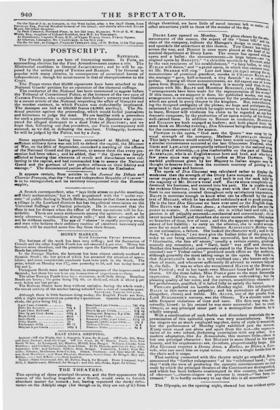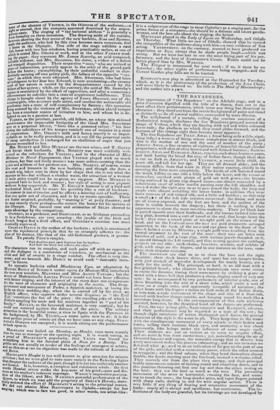The Olympic, on the opening night, showed but too evident
sYrt1)- be absence of VESTILIS, in the thinness of the audience,—a tom-4 of t sual, that the company appeared dispirited by the unpro- sigb. t omen en The singing of " dm national anthem " is generally a us formality on these occasions. The drawing aside of the curtain, taste feormsahowing the first scene of the new burletta, Sans and Systems, tvide-thre' audience, slvho had by this time become more numerous, feel t home in the Olympic. One side of the stage exhibits a neat with two bay-windows, having practicable sashes, at one of ittisaeabouseawted Mrs. ORGER at work, and at the other FARREN read- er: they represent Mr. Lemon Suwerby, an acid.tempered, gir—th psaeg irritable widower, and Mrs. Sweetnian, his sister, a widow of a dulcet and tranquil disposition. Their respective "sons," who are arrived at yea of indiscretion, presently appear in the orbit of the gravel-path before the house; exemplifying, .by their undutiful conduct in clan-
off tw p
o retty girls, the fallacy of the opposite " sys- destinely carrying terns" on which they were educated. Mrs. Sweetman, who had been all indulgence to her dear boy Edward, is now unrelenting—the creamy curd of her nature is soured by the disappointment caused by the failure of her system ; while, on the contrary, the acid of Mr. Sowerby's nature is neutralized by the alkali of opposition, and after a momentary effervescence he subsides into a state of acquiescent indifference. This change is brought about by the agency of Laura Harcourt, one of the saaygirls, who assumes male attire, and soothes the untractable old gentleman into a state of self-complacency by flattery ; this operation being assisted by the violence of Mrs. Sweetman, whose placid temper has been a constant source of irritation to him, and whom he is de. lighted to see in a passion at last. FARBER, as the petulant, peevish, old fellow, on whose thin skinned sensitiveness the impassable benignity of the bland Mrs. Sweetman acts as a perpetual blister, "frets like a- gummed velvet : " his face during the subsidence of his temper reminds one of verjuice in a state of evaporation. Mrs. ORGER'S milk and honey sauvity is so imper- turbable as to be really provoking, and it is not till the perpetual smile a smug satisfaction is exchanged for an ebullition of anger that you become reconciled to her. Mrs. NISBETT and Miss MURRAY are the two wives, and T. GREEN AA SELBY their husbands. Mrs. NISBETT was most cordially wel- corned as the substitute for VESTRTS; and in the character of Miss Mortimer in Naval Engagements, that VF.STRIS played with so much archness, her free and lively manner was more artless-seeming than the point and address of her predecessor. Mrs. Nissen., of course, wears the coat arid trousers in the new burletta; and though she dons a Eratch wig, takes care to show by her shape that she is not what she appears to be—but without a slender waist, the attraction of a woman in male attire would not be so great, we suppose. Miss MURRAY is improved loth in look and manlier ; liar style of acting is now piquant without bang coquettish. Mr. T. Giti.EN's humour is of a bard and mechanical kind, and he wears his gentility like a suit of buckram: his manner is too obtrusive, and he affects a mincing sort of buffoonery, that was quite out of character, and is by no means agreable. These are faults acquired, probably, by "starring it" at petty theatres; and be may remedy them perhaps—the sooner the better for his success at the Olympic. The natural ease and animation of SELBY showed to more advantage by the comparison. °Keeney, as a gardener, and Beciontiam, as an Irishman pretending to be a Scotehman, are very amusing : the jumble of the Irish and Scotch brogue bad a droll effect, and OXIIERBY'S aversion was most comically expressed. CHARLES DANCE is the author of the burletta; which is constructed won the equilateral principle that he so strangely adheres to : the plan of his dramas, like that of the old-fashioned gardens, is geome- trical. To parody POPE'S couplet,
" Part doable* pint, each humour has its brother, And half the story but reflects the other."
The characters tun in couples, and each pairs off with an opposite; and the dialogue is a succession of repartees, as mechanical as the clink and fall of swords in a stage combat. The effect is very tire- some; and we beseech Mr. DANCE to avoid such " damnable itera- tion" in future. An operatic burletta called Mischievous Eyes, an adaptation by BAYNES BAYLY Of SCRIBE'S comic opera Le MauvaislEil, introduced the two new vocalists, MANNERS and Miss AGNES TAYLOR ; but the music of Mademoiselle LOUISA PUGET would not have been effective with better singing, and the interest of the story does not compensate for the want of character and originality in the music. The disap. pointment and annoyance of Pedro, a Spanish muleteer, at losing his bride on their wedding-day, when she is carried off by his rival, an English officer, who appears under several disguises as " the Evil Eje," constitute the furl of the piece : the standing joke of which is Pedro's coupling his mule and his mistress together as " patt of his family." KEELEY as the bereaved muleteer, is very comical ; but he as not contend against the dulness of the piece. The solitary attraction is the beautiful scene, a view in Spain with the Pyrenees in the background, by Mr. TELDIN,.—n name quite new to us: it is the most perfect piece of scenic art that we have seen on any stage, STAN- FIELD'S Diorama not excepted ; it is worth sitting out the performance to look upon it.



























 Previous page
Previous page